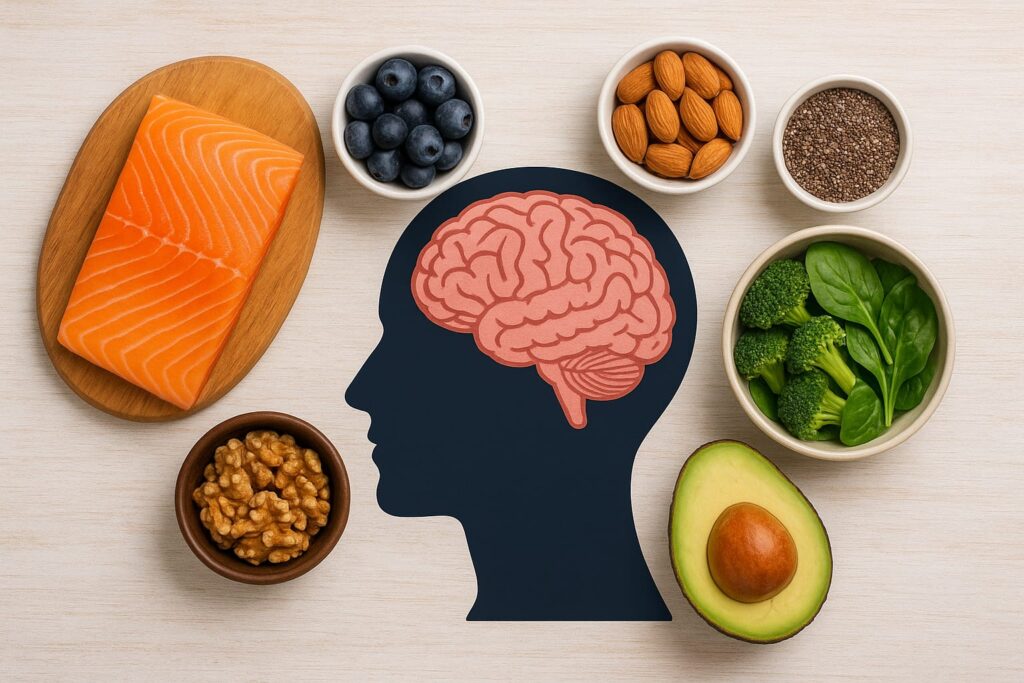How Nutrition Affects Mental Clarity and Focus
In today’s busy world, many people struggle to remain productive and mentally sharp. While sleep, exercise, and lifestyle habits play a role, the connection between nutrition, mental clarity, and focus is especially important. What we eat fuels our brain, influencing energy, concentration, and decision-making.
Just as athletes need the right food for peak physical performance, the brain depends on nutrients to think clearly, process information, and stay alert. Poor food choices can drain focus, while balanced nutrition enhances productivity and mental resilience.

The Science Behind Nutrition, Mental Clarity, and Focus
The brain consumes nearly 20% of the body’s energy, relying primarily on glucose. Refined sugars cause quick spikes and crashes, which reduce concentration, whereas complex carbohydrates release energy gradually, sustaining attention.
Proteins provide amino acids, the building blocks of neurotransmitters such as dopamine and serotonin, which influence mood and focus. Healthy fats, especially omega-3 fatty acids, maintain neuronal communication and reduce inflammation.
This scientific foundation shows how closely nutrition, mental clarity, and focus are linked.
Why Balanced Eating Improves Mental Performance
Balanced meals provide more than calories: they deliver the full spectrum of nutrients needed for cognitive function.
- Carbohydrates give consistent energy for concentration.
- Proteins regulate neurotransmitters that affect learning.
- Healthy fats improve memory and reduce brain inflammation.
- Vitamins and minerals support energy production.
- Water prevents mental sluggishness.
When these elements work together, the brain can perform at its best.
Micronutrients for Mental Sharpness
While macronutrients fuel the brain, micronutrients fine-tune its efficiency.
- B vitamins: Support metabolism and neurotransmitter production.
- Iron: Carries oxygen to brain tissue.
- Magnesium: Calms the nervous system and improves stress tolerance.
- Zinc: Influences learning and memory.
Deficiencies in these areas often lead to fatigue, irritability, and lack of concentration.
Hydration and Mental Clarity
Even slight dehydration can impair focus, memory, and mood. Since the brain is about 75% water, staying hydrated helps nutrient delivery and toxin removal. Drinking 1.5 to 2 liters of water daily, along with water-rich fruits and vegetables, supports mental clarity and alertness.
Foods That Support Nutrition, Mental Clarity, and Focus
Certain foods provide essential compounds for long-term brain health:
- Fatty fish like salmon supply omega-3s.
- Leafy greens deliver antioxidants and B vitamins.
- Berries protect neurons with flavonoids.
- Nuts and seeds contain healthy fats and magnesium.
- Whole grains release glucose steadily.
- Dark chocolate boosts mood and focus in moderation.
Incorporating these foods regularly is one of the simplest ways to support productivity.
The Negative Effects of Poor Nutrition on Mental Focus
Dietary patterns high in refined sugars, processed snacks, and trans fats encourage inflammation and oxidative stress. These changes can slow cognitive processing, cause memory lapses, and even increase the risk of depression. Avoiding such foods is essential for protecting long-term brain health.
Everyday Habits to Strengthen Mental Clarity
Small but consistent actions help maintain concentration:
- Start the day with a protein-rich breakfast.
- Choose complex carbs and healthy fats for steady energy.
- Avoid skipping meals, which can reduce attention span.
- Snack on fruit or nuts instead of processed sweets.
These habits reinforce the natural link between diet and focus.
Meal Planning for Mental Sharpness
Organized meal planning prevents energy crashes and improves concentration:
- Breakfast: Oatmeal with berries and walnuts.
- Lunch: Grilled salmon with quinoa and spinach.
- Snack: A piece of dark chocolate with green tea.
- Dinner: Lentil soup with whole-grain bread and avocado.
Planning meals in advance makes it easier to sustain mental clarity throughout the day.
Lifestyle Choices That Enhance Mental Focus
Beyond diet, lifestyle plays a key role in cognitive function. Exercise increases blood flow to the brain, enhancing nutrient delivery. Sleep consolidates learning and restores energy. Stress-management techniques such as meditation lower cortisol, a hormone that disrupts focus. Together with good nutrition, these habits create a solid foundation for mental performance.
Practical Tips for Better Focus
Here are five simple strategies to apply immediately:
- Swap refined carbs for whole grains.
- Add fatty fish twice a week.
- Drink water steadily, not just when thirsty.
- Choose seeds or nuts as snacks.
- Cook with turmeric or rosemary for brain protection.
Each of these adjustments strengthens concentration and energy.
Conclusion: Building Long-Term Mental Clarity Through Nutrition
The evidence is undeniable: what we eat shapes how our brain performs. Prioritizing nutrient-dense foods, staying hydrated, and avoiding harmful dietary patterns all contribute to sharper thinking and sustained attention.
By focusing on nutrition, mental clarity, and focus, we empower ourselves to improve productivity, mood, and cognitive resilience. Every meal becomes not just a source of fuel, but an investment in long-term mental health.
